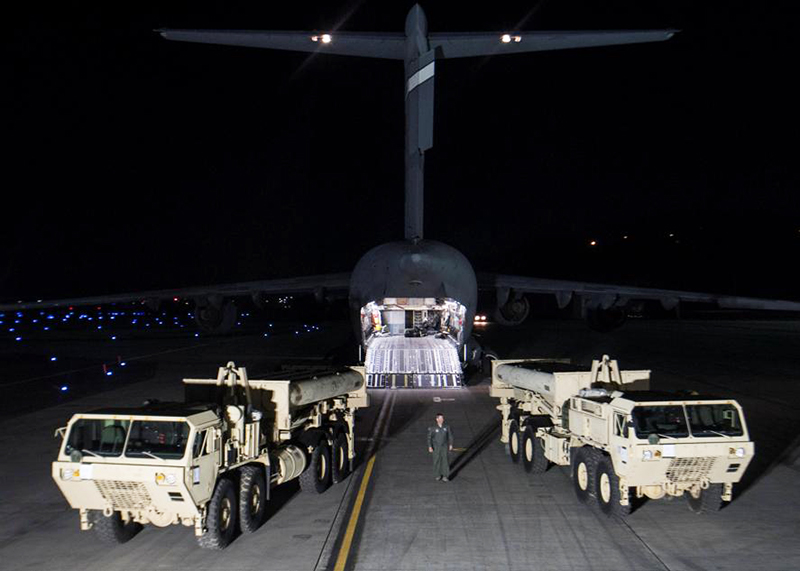Media Report

- The Washington Post reports: "China warned Tuesday of 'consequences' for South Korea and the United States over the deployment of a U.S. antimissile system, raising regional tension and posing a challenge to the Trump administration. In Seoul, officials said they expected retaliatory moves against South Korean businesses. China's foreign ministry did not specify any actions against the United States, but Beijing's displeasure marked an abrupt change in tone after a generally cautious approach until now toward the new president. The U.S. military began deploying the Terminal High Altitude Area Defense (THAAD) system to South Korea on Monday, the same day North Korea launched four missiles that landed off the Japanese coast. The United States and South Korea say the system is a necessary defense against Kim Jong Un's regime, but Beijing rejects the argument. It sees the system as a threat to the Chinese military and evidence of U.S. 'meddling' in East Asian Affairs. 'I want to emphasise that we firmly oppose the deployment of THAAD,' said Geng Shuang, a spokesman for China's Foreign Ministry, at a daily press briefing in Beijing on Tuesday. 'We will resolutely take necessary measures to defend our security interests.' "
- Bloomberg reports: "China's foreign-currency reserves unexpectedly halted a seven-month losing streak, rising in February amid tighter controls on capital outflows and a rally in the yuan. The stockpile increased by $6.9 billion to $3.005 trillion last month, the People's Bank of China said Tuesday. That exceeded the $2.969 trillion estimate in a Bloomberg survey of economists. 'Strict capital controls have taken effect, as it has reduced outflows and helped market sentiment on the yuan,' said Zhao Yang, Hong Kong-based chief China economist at Nomura Holdings Inc., which Bloomberg ranks as the top forecaster for the stockpile. 'Reserves still face pressures, as the nation won't want to keep tight capital controls in place for the medium term as they create difficulties for firms and thus weigh on the economy.' Stronger economic growth, stricter capital controls and a stabilizing yuan are helping stem declines in the world's largest foreign-currency hoard. The reserves -- still the world's largest -- have shrunk from a peak of $4 trillion in 2014 as policy makers sold dollars to slow yuan depreciation."
- The Wall Street Journal comments: "China's latest plan to dominate advanced manufacturing marshals billions of dollars in subsidies, investment and other government support that a foreign group says distort the market and may end up wasting a huge amount of capital. China's 'Made in China 2025' represents a next-level evolution in industrial policies that are posing a challenge to foreign businesses, says a report released Tuesday by the European Union Chamber of Commerce in China...The EU chamber report, however, said the 'Made in China 2025' policy threatens to undermine fair competition and hurt the Chinese economy by fueling overcapacity, bad debt and inefficient and misdirected investment. 'C'mon guys, we've seen this before,' chamber President Joerg Wuttke told reporters. 'Very often these major plans, with lots of money, where government bureaucrats decide who's the winner and who's the loser, end up in tears.' The report pointed to Beijing's cybersecurity law, rules on data and security–which foreign companies say may compromise their proprietary information and technology–and policies that keep China's technology sector from fully integrating with the rest of the world could encourage foreign firms to base some operations elsewhere."
Calendar
- 2017-03-06 North Korea tests four more missiles — and China’s patience
- 2017-03-05 China overtakes eurozone as world's biggest bank system
- 2017-03-03 China Is Running Out Of Cheap Rural Labor And It's Because Of Failed Reforms
- 2017-03-02 How Trump could find common ground with China, thanks to the Islamic State
- 2017-03-01 Economic Coercion, with a Chinese Twist
- 2017-02-28 'The president always gets something': Spicer suggests Trump gained concession from China
- 2017-02-27 1st senior Chinese official visits Washington in Trump era
- 2017-02-26 For More Chinese Firms, It Pays to Make It in the USA
- 2017-02-24 China hits back at Donald Trump's 'champion of currency manipulation' jibe
- 2017-02-23 As China Ups Heat on NKorea, US Faces Questions
News
- The Washington Post China Warns of "Consequences" Over Deployment of U.S. Antimissile System
- Bloomberg China Reserves Post First Gain Since June Amid Capital Curbs
- The New York Times China's Plan to Build Its Own High-Tech Industries Worries Western Businesses
- Reuters South Korea says to 'actively' consider filing WTO complaint against China
- The New York Times Attacks by Rebels in Myanmar Leave Dozens Dead
- The Financial Times European businesses attack China high-tech push
- BBC Cities and data: China's weapons in the battle for clean air
- The Guardian Solar power growth leaps by 50% worldwide thanks to US and China
- Bloomberg When China's Got a Gripe It Can Turn a Billion People Against You
- Reuters China says Dalai Lama a 'deceptive actor' after brain comments
- The Guardian 'Parched' Chinese city plans to pump water from Russian lake via 1,000km pipeline
- The Wall Street Journal Who Is Hacking the U.S.?
- The Financial Times Alibaba's Jack Ma calls on Chinese government to crack down on fakes
Commentary
- The Wall Street Journal: China Real Time Report China's Latest Industrial Policy Is a Waste and a Challenge, Business Group Says
- Forbes The Tesla China Numbers That Elon Musk Won't Tell You
- Bloomberg: Gadfly Trump's Gift to China Tech Hiring
- Quartz China is worried that "deglobalization" and protectionism will threaten its growth
- The Diplomat For the United States, Freedom of Navigation in Asia Concerns More Than Just China
- Foreign Policy Don't Call it the New Chinese Global Order (Yet)
- The National Interest The Shocking Way China Would Try and Crush America in a War (or World War III)
